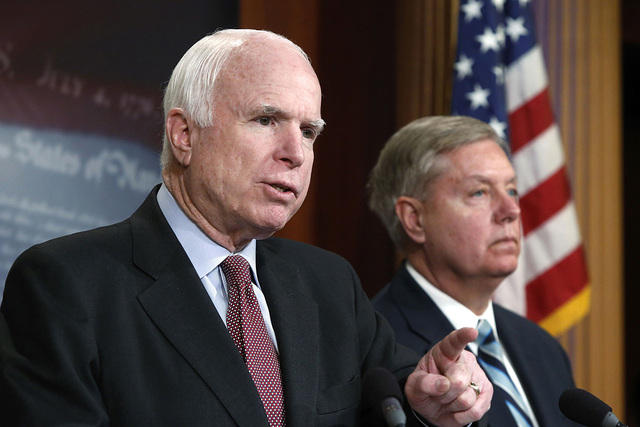McCain calls for hearings on expanded sports betting

WASHINGTON — With all eyes on the Super Bowl and the billions of dollars being wagered — mostly illegally — on the game, Sen. John McCain says Congress should hold hearings whether to expand legalized sports betting that now largely is limited to sports books in Nevada.
McCain, R-Ariz., said he favors allowing states that sponsor legalized gambling to accept sports bets as well, and would extend the invitation to Indian tribes that operate casinos. He said he does not favor gambling over the Internet.
“We need a debate in Congress,” McCain said. “We need to have a talk with the American people and we need to probably have hearings in Congress on the whole issue so we can build consensus.”
Asked in an interview why Nevada should have sports betting and nobody else, McCain said, “I think you have an excellent point and that’s why it is a national issue.”
“I think that there is a place for sports gambling in states where gambling is legal,” he said.
According to the American Gaming Association, there are commercial or tribal casinos in 40 states. Counting lotteries, there is gambling in 48 states and the District of Columbia. There is no legal gambling in Utah and Hawaii.
McCain, whose state is hosting the Super Bowl on Sunday, spoke on an ABC/ESPN podcast recorded Thursday. Discussion on sports betting comes in the wake of an estimate by the American Gaming Association that $3.8 billion will be wagered illegally on the game, 38 times more than will be bet legally.
AGA President Geoff Freeman, also interviewed on the program, said the Super Bowl numbers show it is clear current law on sports gambling “is not working.” The AGA is talking among its members on possible responses including whether to advocate giving gamblers more options to cast legal bets.
“From a casino industry perspective, we’re not sure what the right solution is here. How do we figure this out,” Freeman said. “This is a discussion we are having internally in this industry, and that’s a discussion that needs to happen.”
Meanwhile, sports gambling was a bright spot in Nevada last year, while casino totals dipped slightly, according to state figures released Friday. Revenue from sports wagers hit a record $227 million, a jump of almost 12 percent from 2013.
Nevada is one of four states that were grandfathered into the 1992 Professional and Amateur Sports Protection Act, and allowed to sponsor sports betting. Montana, Oregon and Delaware are the others; there is limited NFL parlay card betting in Delaware, according to the AGA.
However, the issue of sports betting might become part of the congressional agenda, even if most people doubt Congress could come up with a solution, let alone in any timely manner.
Freeman said there is not a high likelihood that Congress will act in the near term, “but the discussion is beginning and that’s good.”
In a New York Times opinion piece in November, National Basketball Association Commissioner Adam Silver said legalized sports gambling should be expanded outside Nevada and regulated by the federal government. He became the first leader of a major sports league to call for change.
“There is massive sports betting going on in this country,” Silver said in a subsequent interview with ESPN. “If it is going to go on, let’s make it transparent. Let’s bring it into the sunlight, so to speak.”
Silver said he was advocating federal regulation because “there needs to be consistency from state to state.”
Calls for a broader field of sports betting are likely to become entwined in a debate Congress is about to renew over Internet gambling.
Rep. Jason Chaffetz, R-Utah, is preparing to reintroduce a bill that would effectively prohibit all forms of Web gaming. That position is advocated by Sheldon Adelson, the billionaire chairman of the Las Vegas Sands Corp., who argues online gambling is corrosive to society and a bad business move for the casino industry,
The Chaffetz legislation would reverse a 2011 Department of Justice opinion that the Interstate Wire Act of 1961, the law that prohibits transmitting wagers, applies only to sports and not to other forms of online gambling. The interpretation has led states to explore sponsorship of Web gambling, and three states — Nevada, Delaware and New Jersey — have done so,
On Wednesday, Sen. Lindsey Graham, R-S.C., another Adelson ally, sought to draw out a position on Internet gambling from Attorney General nominee Loretta Lynch She said she was generally familiar with the issue but had not examined it in depth.
McCain said he also opposes Web gambling.
“One of the problems I see with Internet gaming is the ability to distort the playing field so it can be harmful to individuals and lead to corruption in the sport,” he said on the podcast. For their part, advocates of Web gaming argue those fears are overblown, that with proper regulations and the use of technology tools, the games can be run safely.
Review-Journal writer Howard Stutz contributed to this report. Contact Stephens Washington Bureau Chief Steve Tetreault at stetreault@stephensmedia.com or 202-783-1760. Find him on Twitter: @STetreaultDC
RELATED:
Super Bowl heightens debate on legalizing sports wagering


















